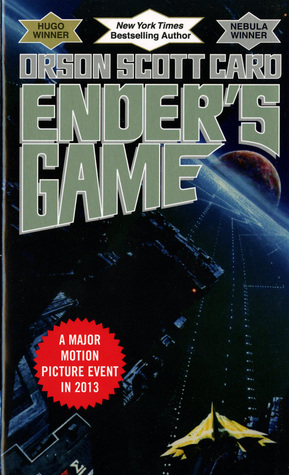Author: Orson Scott Card
Rating: 3.5 stars
Review Contains Spoilers
In its opening weekend, Ender's Game claimed the number one spot at the U.S. book office. For decades, the book has gained fans and caused controversy. Some of Orson Scott Card's views come out in the book. Military/patriotism, extreme propaganda and war tactics are themes that add and take away from the novel's quality.
Six-year-old Ender Wiggins is growing up in a dysotopian world. Propaganda teaches people aliens almost wiped out the human population and could come back at any time to finish the job. The same images of war are shown, with vital parts missing. Families are only allowed to have two children and the government is constantly watching. Children deemed sufficient by them are taken away to be trained as soldiers for the alien war.
The whole novel shows how Ender is manipulated and played by adults. Believed to be the future hero, he's isolated from other children to gain leadership skills and just be screwed with. The only person he misses is his sister, Valentine. His brother, Peter, continues to internally torture Ender like he did at home.
My major qualms came with the book's overtones and characterization. Ender's siblings seem to represent the good and bad he sees in himself. While he's away his siblings manage to create political personas via blogging and influence public opinion greatly. This plot could have been brilliant--Card predicted the future pretty well--and it's not hard to believe the public would fall for anything. However, I still find it hard to believe their personas became so popular they began to influence the world and outer space. At the end of the novel we see Valentine leave Earth and her family to travel with Ender. Peter is mentioned on and off until his death. A greater resolution between Peter and Ender would have been much appreciated--especially after so much turmoil and drama between the two. I felt like readers were cheated from that, although I have not read the sequels.
Another low point is Ender's progress--he remains the greatest at what he does and never suffers actual repercussions. Yes, he has a breakdown and almost starves himself after committing genocide. Yes, we know he completely regrets what he did. He and Valentine go on a galaxy quest of sorts which ends with inhabiting the planet of their "former" enemy. Ender preaches the message of love--knowing how to love and defeat your enemy at the same time. Not only do I find it hard to believe he could turn this message into a religion but when it comes to war I don't think this theory holds. I liked the idea of Ender finding the dormant egg and carrying it around but the "only when you love your enemy can you defeat him" did not match. The book's strongest point, propaganda, fizzled out. Instead we got all these characters getting the upper hand in the future without accounting for their actions. I daresay Ender's message at the end started feeling like propaganda to me in a way.
I can see why the book has been a hit, but I can also see why it's caused rifts. I don't plan to read the sequels. Ender's Game was dense for me at times and all the scenes with naked boys bathing and fighting in the showers could have been spared. Hopefully Ender's adventures continue with a dash of character development.

No comments:
Post a Comment